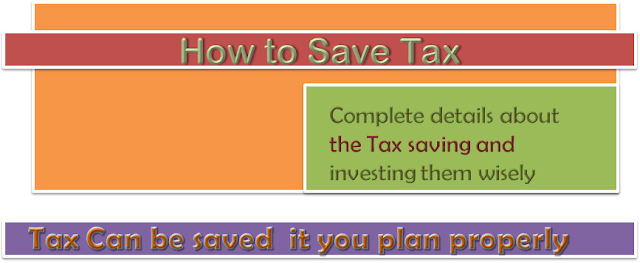-->
Proper tax planning can help you in saving lot of money. Start from a proper planning by dividing your income within your relatives. By doing this each individual will be able to maintain their own tax slab and can enjoy their personal tax exemption limits. If each family member is having their own income source, then they become legally an independent tax payer.
The income of the individual can’t be distributed among the family member. The simple way is by using the facility of Gifts and Settlements.
There are also other tax exemptions limits as mention below
A) Section 80C (Limit upto Rs.1,00,000/-)
This includes the following
FD for min 5 Years
ELSS
NSC
Post Office SB
Infra Sector Bonds
Child education expenditures (limited to Rs.200 per month and for 2 children)
Tuition fees (Max limit Rs.24,000)
Housing Loan
B) Section 80CCD
This deduction is over and above the deduction available under section 80C
If the NPS account is provided by your employer and deduction is limited to 10% of the basic salary, then you can claim the benefit. Only the returns on NPS are tax free and the withdrawals are taxable.
C) Section 80CCG
Under “Rajiv Gandhi Equity Saving Scheme”, if the investor has the taxable income below Rs.10 Lakhs, the investor will be able to claim 50% deduction of his investment in the equity, limited to the investment of Rs.50,000
The Investment should be lock in for minimum 3 years.
D) Section 80TTA
The interest received on Saving Bank account upto Rs.10,000 every year is tax free.
E) Section 80D
Medical insurance premium for self and dependents upto max Rs.15,000
Health Check-ups upto Rs.5000
If Self / dependent is Senior Citizens, medical insurance premium for self and dependents deduction allowed upto Rs.20,000
If parent is senior citizen, deduction allowed upto Rs.20,000 for premium paid for medical insurance
F) Section 80DD
Any expenditure made for disabled dependent towards treatment / rehabilitation / training and also the premium paid for LIC insurance for the disabled dependent.
Claim can be made upto Rs.50,000 for normal disabled and Rs.1,00,000 for severe disabled dependent.
G) Section 80DDB
Deduction of upto Rs.40,000 is allowed for the expenditure made towards disease or ailment such as cancer, aids etc
For Senior Citizen the deduction is upto Rs.60,000
H) Section 80E
Deduction allowed for any load repayment for higher education (all education above 12th Class is allowed both for vocational of Full Time. Condition, that the school / college / institute to be registered / recognized with government.
I) Section 80G
Donation to the political parties is 100% exemption and donation to charities depending on charity like 25/50/75/100%
J) Section 80U
For permanent disabled upto Rs.50,000 allowed and for the permanent disabled more than 80%, the maximum deduction permitted is Rs.1,00,000
K) Section 24(1)(vi)
Housing loan interest limited to Rs.1,50,000 for loan taken after 1st April 1999
Other than these the other exemption is allowed for any contribution company in the hands of the employee upto Rs.1,00,000 tax free. Transport Allowance or Conveyance charges upto Rs.9,600 is tax free. No supporting bills are required.
House Rent Allowance (HRA) given to an employee is tax free for 50% of the annual basic in case of metros and 40% of basic in case of non-metros. Or the actual HRA received or the rent paid upto 10% of annual basic.
Provident Fund investment upto Rs.1,00,000 is tax exempted, subjected if the overall investment limit of Rs.1,00,000 under section 80C.
No income tax is on the Gift received from your family and specific relatives. Gifts received from parties other than relatives upto Rs.50,000 is exempted from income tax.
Gifts received at the time of marriage upto any amount is tax exempted. Gift received should be genuine and the person making gift should have the proper details for the source for making gift. Kindly note, as per section 64, there should not be any direct or indirect transfer of funds between assesses and his/her spouse. Means if the husband makes gift to wife or wife makes gift to husband, it will be taxed.


Very nice article. You have explained easy ways to make money online.
ReplyDelete